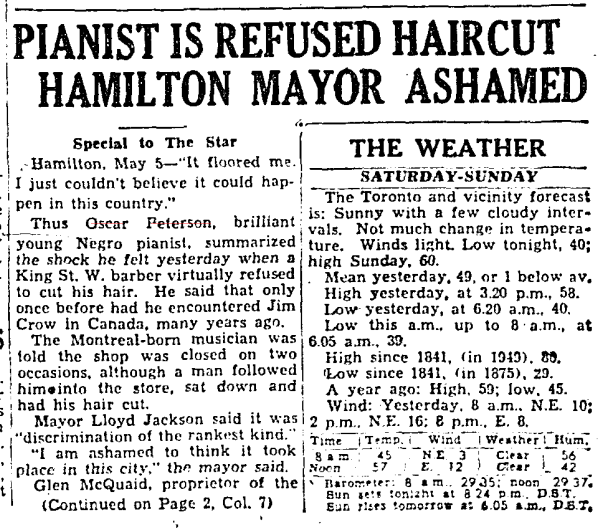Barbers, Oscar Peterson &
Incidents of Racism in Hamilton
75 King Street West
Barbering was a historically skilled trade amongst Black men in Canada throughout the nineteenth century. Black barbers often worked in cities and owned their own businesses. However, targeted racism effectively segregated the profession by 1900 and made it harder for skilled Black workers to live and work in Hamilton.
In 1951, the famous pianist Oscar Peterson and his friend and bassist Ray Brown walked into a barbershop owned by a white person on King Street West and were refused service. This incident made the news across Canada and highlighted the systemic issues of racism within professional and social environments that Black Canadians frequently encountered.



In an urban centre like Hamilton, barbering was a common trade for many Black men from the mid-nineteenth century onwards. Many early Black barbers learned barbering while living as enslaved persons, where personal service skills were valued by white slaveowners. Skilled Black people lived and worked in abhorrent conditions. After escaping slavery, many barbers opened for business in Canadian cities like Hamilton, but they still faced racism and oppression.
Historian Adrienne Shadd notes that according to census data in Hamilton in 1861, almost 10% of employed men (15) listed barber as their trade. In 1871, she reports the total number of local Black barbers had risen to 21. However, as Jim Crow laws institutionalized racist business and social practices in many parts of the United States, similar attitudes and tactics of segregation also took hold in Canada. By the turn of the century in Hamilton, segregated barber shops became normalized and local Black barbers and their businesses suffered. Shadd reports that by 1901, only 6 Black barbers were listed in local Hamilton census data. Black barbers continued to occupy a smaller but significant sector of the profession by catering to a predominantly Black clientele and diversifying their business practices. Segregation and prejudice continued to affect the local community and moments of public awareness about racism were few and far between.
However, one such moment occurred almost 60 years later in another Hamilton barbershop located at 75 King Street West. On May 4, 1951, famed jazz pianist Oscar Peterson and bassist Ray Brown stepped into the Commerce Barbershop for a haircut. The Commerce Barbershop was run by Glen McQuaid, who was white. Peterson and Brown were staying in Hamilton temporarily, playing a series of local shows. They were told by McQuaid that the shop was closed. When they reappeared later that day, trying once more to get a haircut, they were told again that the shop was closed. However, as they were standing in shop, another man walked in and was served. Peterson went back to his hotel and called the police, who referred him to the Crown Attorney to press charges.
The incident made front page headlines in papers across Ontario and Peterson was quoted saying “It floored me. I just couldn’t believe it could happen in this country.” Hamilton’s mayor at the time, Lloyd Jackson also went on public record saying that he was “ashamed” that such an occurrence had happened in Hamilton. Peterson’s fame brought media coverage to an event that resembled the frequent experiences of prejudice and systemic injustice that many Black Canadians have faced for centuries. In 1962, Oscar Peterson composed his masterpiece “Hymn to Freedom” that became an anthem of the ongoing Civil Rights movement in both the United States and Canada. Of his composition, Peterson wrote "All the lyrics had to do was express the hope for unity, peace and dignity for mankind. It was easy to write.”
